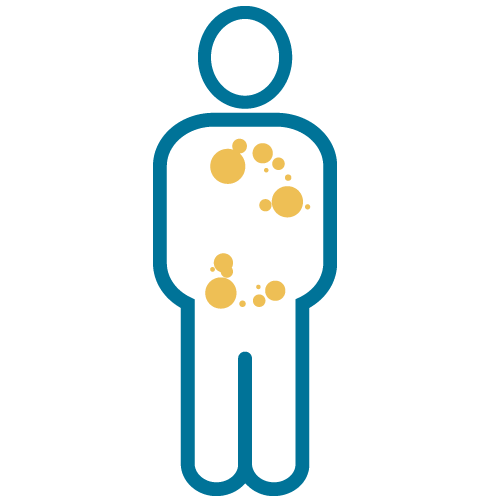

Cancer is a genetic disease
Genes are the instructions to make proteins, which carry out important functions in our cells including telling cells when to grow and divide. Cancer is caused by genetic abnormalities; that is, changes (e.g. mutations, deletions, fusions etc.) to certain genes that control the way cells grow and divide. In some cases, these genetic changes cause too much protein to be produced or the protein to deform and function abnormally.

NRG1 Fusions drive cancer in some patients
NRG1 Fusions are genetic abnormalities found in a small percentage of patients with solid tumors. In these patients, too much of the growth factor NRG1 (sometimes called heregulin) may be produced, which is capable of causing cancer cells to grow and divide in an uncontrolled manner. Blocking NRG1 and its cancer-driving activity with a medicine may help fight your cancer.

Small percentages of multiple types of solid tumors have NRG1 Fusions
A recent study identified the following tumor types that harbor an NRG1 Fusion: non-small cell lung cancer, gallbladder cancer, renal cell carcinoma, bladder cancer, ovarian cancer, pancreatic cancer, breast cancer, neuroendocrine tumor, sarcoma, and colorectal cancer. A test of a patient’s cancer can be conducted to determine if his or her tumor has an NRG1 Fusion.

Experimental Medicine:
zenocutuzumab (MCLA-128)
Zenocutuzumab (MCLA-128) is an experimental cancer medicine being studied in a Phase 1/2 clinical trial in cancer patients who have solid tumors that have a specific genetic abnormality called an NRG1 Fusion. Zenocutuzumab (MCLA-128) is believed to work by blocking the protein produced by the NRG1 Fusion that has cancer-driving activity.
At this time, there is no approved therapy for the specific treatment of NRG1 Fusion-positive solid tumors. Zenocutuzumab (MCLA-128) is an intravenous (IV) medication that is given through a tube infused in a vein in a patient’s arm every 2 weeks. The infusion typically lasts from 2-4 hours each time it is administered.
Zenocutuzumab (MCLA-128) is an experimental medicine and it has not yet been approved for sale by any regulatory authority anywhere in the world and has not been determined to be safe and effective for the purpose for which it is under investigation.
The biopharmaceutical company, Merus N.V., is the sponsor of the clinical trials for and developer of zenocutuzumab (MCLA-128). Information can be found at ClinicalTrials.gov.

Talk with your doctor about
clinical trials
If interested in participating in a clinical trial, please talk to your physician to discuss if participating in a clinical trial may be an option for the treatment of your cancer. Your doctor can help answer any questions for you about your type of cancer, the clinical trials that might be available to you or other treatments that could be available. Your decision to participate in a clinical trial is voluntary and should only be made after all your questions have been answered and you have been able to make a well-informed decision.

